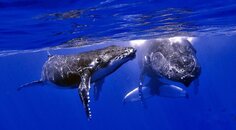I hope notwas your boat tied off to buoy in 15ft swells?
You are using an out of date browser. It may not display this or other websites correctly.
You should upgrade or use an alternative browser.
You should upgrade or use an alternative browser.
Should I wear a snorkel or not
- Thread starter Happyladydiver
- Start date
Please register or login
Welcome to ScubaBoard, the world's largest scuba diving community. Registration is not required to read the forums, but we encourage you to join. Joining has its benefits and enables you to participate in the discussions.
Benefits of registering include
- Ability to post and comment on topics and discussions.
- A Free photo gallery to share your dive photos with the world.
- You can make this box go away
Capt Jim Wyatt
Hanging at the 10 Foot Stop
Staff member
ScubaBoard Business Sponsor
ScubaBoard Sponsor
ScubaBoard Supporter
Scuba Instructor
Divemaster
Its a Mojo Risin', Jim
L13
Contributor
It was in (@Waterwulf 's) "story" above, until the squall came along and the waves suddenly went for calm dive-able from a tied off boat to un-survivable tied of or without a snorkel, and then back in an hour.I hope not
David Haas
Contributor
This is one the funniest entertaining threads in awhile so I may as well chime in too!
As a long ago scuba instructor (1978-1990) yes, agencies required snorkels on student's masks at least for training dives.
Back then it was required to introduce snorkeling including proper free dives, clearing your snorkel with "blast" and "displacement" methods, etc. It was a good "watermanship skill" that added to people's comfort learning to scuba dive.
Then came what I call the most ridiculous, drag heavy, over engineered pieces of junk ever.....FLEX mouthpiece snorkels and HUGE "nuclear ccoling tower" GIANT gizmo top purge valves
They flop around, collapse if swimming in currents or fast. The corrugated mouthpiece would confuse students who thought they had their snorkel in their mouth accidentally grabbing their BCD hose. Just awful........Also new "clip" type attachments which added to the "floppiness" didn't help.
Like a plain snorkel keeper was real hard to attach (sheesh....)
If you stuck to a plain Jane "j" style snorkel with or without a simple mouthpiece purge you at least knew the difference between it and your BCD corrugated hose......We'd tuck the mouthpiece under our chin out of the way and yet still be accessible.
Fast forward from 1990.....Today, no, I don't wear it except snorkeling like with sea lions, dolphins or humpback whales in Moorea', French Polynesia. But it's always in my bag ready to shove under the strap when the Captain yells for dolphins or whatever sighted and you have maybe 20-30 seconds to get in the water
Both the wife and I have such a simple snorkel captured upside down behind our BCD. Never in the way or on our masks unless we need them.
Those simple snorkels are now in the realm of free divers, spear fishermen or just those who like diving without tanks.
I've posted how I believe we've made diving WAAAAAYYYYYYY too complicated these days but that's a discussion for another time .
So wear one or not, whatever!
Just go diving more and sharpen your skills to be more comfortable underwater
David Haas



As a long ago scuba instructor (1978-1990) yes, agencies required snorkels on student's masks at least for training dives.
Back then it was required to introduce snorkeling including proper free dives, clearing your snorkel with "blast" and "displacement" methods, etc. It was a good "watermanship skill" that added to people's comfort learning to scuba dive.
Then came what I call the most ridiculous, drag heavy, over engineered pieces of junk ever.....FLEX mouthpiece snorkels and HUGE "nuclear ccoling tower" GIANT gizmo top purge valves
They flop around, collapse if swimming in currents or fast. The corrugated mouthpiece would confuse students who thought they had their snorkel in their mouth accidentally grabbing their BCD hose. Just awful........Also new "clip" type attachments which added to the "floppiness" didn't help.
Like a plain snorkel keeper was real hard to attach (sheesh....)
If you stuck to a plain Jane "j" style snorkel with or without a simple mouthpiece purge you at least knew the difference between it and your BCD corrugated hose......We'd tuck the mouthpiece under our chin out of the way and yet still be accessible.
Fast forward from 1990.....Today, no, I don't wear it except snorkeling like with sea lions, dolphins or humpback whales in Moorea', French Polynesia. But it's always in my bag ready to shove under the strap when the Captain yells for dolphins or whatever sighted and you have maybe 20-30 seconds to get in the water
Both the wife and I have such a simple snorkel captured upside down behind our BCD. Never in the way or on our masks unless we need them.
Those simple snorkels are now in the realm of free divers, spear fishermen or just those who like diving without tanks.
I've posted how I believe we've made diving WAAAAAYYYYYYY too complicated these days but that's a discussion for another time .
So wear one or not, whatever!
Just go diving more and sharpen your skills to be more comfortable underwater
David Haas



If in a calm lake with no swells or waves that would work fine. In the ocean, 7 miles offshore it is rare to have that luxury and waves would continually roll over your face.
In a BPW configuration you are working hard to remain face up.
Umm no its not. Pretty much all I dive is bpw, no issues face up. When it happened to me I was in a back inflate and I just laid back and held up the smb.
L13
Contributor
There are times when diving that a snorkel makes things more pleasant, and I will even grant that in the ocean there may be times that it is necessary for survival. Which is why I have one in my pocket in open water.
But there are more scenarios where having it on your mask will cause safety problems than there are where it will save your life (but wouldn't if it was in your pocket). Especially if you are doing any kind of over the neck long hose setup.
And stories where 15 swells, survivable only with a snorkel, appear and disappear in a mater of an hour or two don't seem that likely.
But there are more scenarios where having it on your mask will cause safety problems than there are where it will save your life (but wouldn't if it was in your pocket). Especially if you are doing any kind of over the neck long hose setup.
And stories where 15 swells, survivable only with a snorkel, appear and disappear in a mater of an hour or two don't seem that likely.
Which is why I have one in my pocket in open water.
Same here.
60plus
Contributor
Yes, carry one but carry it somewhere near your waist. Not where it pulls on your mask or gets mixed with hoses or BCD vent / fill hose. I carry mine inside my T shirt or wetsuit (front zip) When in drysuit I hang it on a D ring on my BCD pocket. Mine is a Cressi and I leave the small clip on my mask strap.
Sorry, I wasn't clear. The last few sentences of my post above refer to people at the shore diving under a breaking wave to escape it, NOT scuba divers out at sea.Negative ghost rider. People barely feel a tsunami in the open ocean. It doesn't become a "wall" until it begins to lose depth in the shallows. It's often a surprise to boaters and divers when they return to shore after a tsunami, because they did not really feel it.
Shot line and deco station.was your boat tied off to buoy in 15ft swells?
Similar threads
- Replies
- 19
- Views
- 2,147
- Replies
- 13
- Views
- 1,658
- Replies
- 22
- Views
- 2,420
- Replies
- 14
- Views
- 1,761



